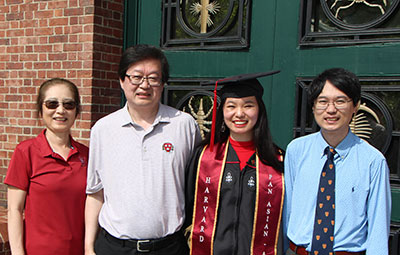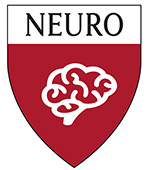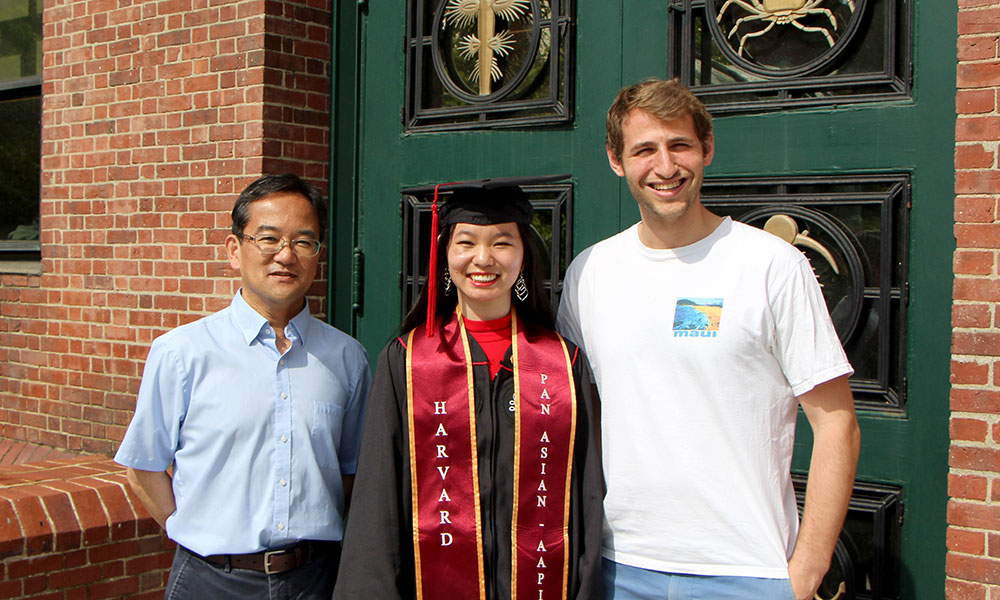Neuroscience concentrator Melissa Meng has been awarded the Glushko Undergraduate Thesis Prize, which honors students who write theses in cognitive science. It is issued by the Mind Brain Behavior Interfaculty Initiative. Meng conducted her research in the Uchida Lab.
In her thesis, Meng investigated whether distributional reinforcement learning, a mathematical construct for describing how learning might happen, occurs in the mammalian brain. “The field of RL [reinforcement learning] asks how agents – humans, animals, or machines – can learn from trial and error to maximize the total reward they obtain,” explains Uchida Lab graduate student Adam Lowet, who mentored Meng. “This reward may be a random variable – that is, it is drawn from some probability distribution, rather than being fixed. Traditional RL simply averages over this randomness, but recent work in machine learning has demonstrated that learning the entire distribution of rewards, rather than just the mean, can be beneficial.”
To find out, Meng started with a traditional laboratory task for mice. “I recorded neural activity from the striatum of well-trained mice performing a classical conditioning task that associates random odors with different reward distributions,” she explains. “For the second part of my thesis, I decided to look into the neural basis behind distributional coding in the striatum. To investigate this, I induced a unilateral lesion using a neurotoxin to ablate dopaminergic neurons in the ventral striatum of mice as they performed the same classical conditioning task. From these experiments, we were able to provide direct evidence for distributional RL in the mammalian brain, show that striatal populations encode for not only mean, but also variance, and conclude that dopamine serves as a teaching signal for distributional RL in the striatum.”
“Entrusting undergraduates with so much responsibility is extremely rare in the Uchida laboratory, but Melissa’s combination of enthusiasm, commitment, reliability, and curiosity left us no choice,” Lowet says. “As often happens in science, this passion was rewarded by the discovery that distributional representations were in fact impaired in dopamine-depleted brains, compared to intact brains. Melissa’s contribution has been recognized in the form of co-authorship on three posters presented at top conferences in the field, two contributed talks, and an in-revision manuscript.”
“Melissa spent a lot of time in the lab performing many difficult experiments,” adds MCB faculty Naoshige Uchida. “She was very much dedicated and grew her interest and passion in neurobiology research as she learns new experiments and gets exciting results. Melissa’s experiments led to important discoveries such as that dopamine plays a crucial role in learning to acquire neural activity reflecting the probability distribution of rewards, above and beyond the average reward.”
Meng will pursue a Ph.D. in Neuroscience at Yale in the fall. Over the summer, she’ll be spending time with her family in Blacksburg, Virginia and traveling in China and South Korea.
“I am extremely honored and grateful to receive the Glushko Prize, especially among such an incredible group of nominees, and I would like to thank several individuals for making this entire thesis possible,” she says. “I’d first like to thank my PI and supervisor, Dr. Naoshige Uchida, for providing me the incredible opportunity to be a part of this lab and for helping me learn and grow significantly as a student, researcher, and person during my time at Harvard. I’d also like to thank my mentor, Adam Lowet, who is a graduate student in the Uchida Lab, for teaching me everything I know and for always showing me so much encouragement and support with all of my endeavors. I also want to thank the entire Uchida Lab for welcoming me with open arms and for being not only inspirational, but also incredibly kind role models.”
Meng adds, “Additionally, I’d like to thank Dr. Laura Magnotti, my concentration advisor, and Dr. Ryan Draft, Dr. Kristina Penikis, and Mr. James Poolner for facilitating the wonderful undergraduate neuroscience community that I’m so proud to be a part of. Lastly, I’d like to thank all of my friends and family (particularly my mom, my dad, and my brother) for supporting me unconditionally every step of the way throughout my entire college career.”

(l to r) Wen Li (mom), Xiang-Jin Meng (dad), Melissa Meng, and Bowen Meng (brother)



